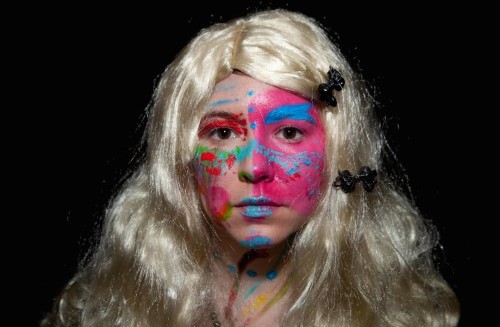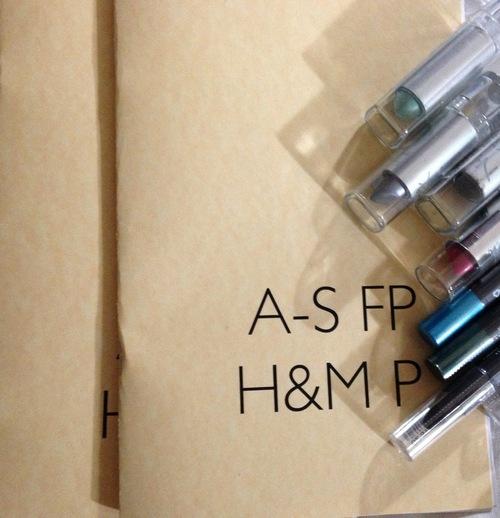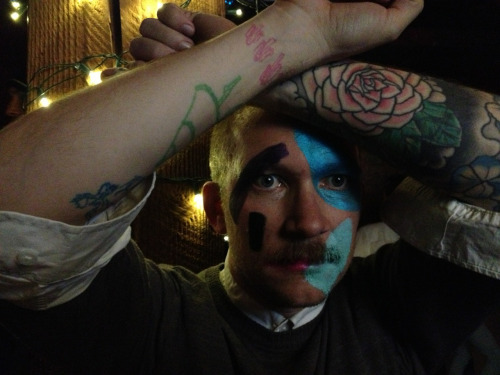
In this and the rest of my Harriets I want to talk about the conditions for what I’ll loosely call Post-Poetry: Crypto, AnonyPo, Outlander-, and Lulz. More than anything, these are strategies for simply being a poet outside the MFA (now PhD) market and hierarchy; ways of engaging outside the poetry communities based mostly in the big cities; and challenging the bookness of our current poetry culture while remaining engaged with something like the rest of the world. It’s not against anything, per se, and it’s certainly not coherent/pure. It’s gross. It’s the gum under the desk.
The most fun I had during the angsty petit capitalisme of AWP2014 was on the last night in some nightclubbish basement somewhere in Seattle where a group of Goonies had gathered to have a few last drinks.
A dance floor, a DJ, Soul Train on the flat screen. In the back corner, a group of women applied deliberately bad Bowie makeup in big blobs of blacks and pinks and greens and blues. I didn’t know them, but it looked interesting, so I asked if I could have a helping on my face. The makeup artist—Stephanie Young, it turned out—handed me a pamphlet she'd written. It had a pukey yellow cover with the letters A-S FP H&M P in Helvetica Neue. It was a primer for the Anti-Surveillance Feminist Hair & Makeup Party, which was what was happening.
The A-SFPH&MP is a total joke in the face of mass sur-veillance on an industrial level, virtual base-tower transceivers, Wi-Fi fingerprint mapping, GILGAMESH and SHENANIGANS, geolocation algorithms, unmanned aerial vehicle flights, kill chains, Reaper and Predator, “Lightning” and “Sky Raper”

I read bits of the pamphlet while she did my makeup, explained CV dazzle and the way it can beat facial recognition algorithms on sites like facebloke or surveillance systems in public places. (You can read the whole brilliant Dusie pamphlet HERE, and check out the A-S FP H&M P Tumblr with more pictures HERE.)
This is Stephanie’s account of that night from a talk she gave at &NOW this year:
At the bar in Seattle I had the makeup in my bag but no plans. Jen asked me to do her face. She wanted to earlier, in the exhibit hall, but didn’t want to walk back to the hotel alone wearing it. She didn’t want to be the only one at the bar either. I put it on with her, it felt good. Noel was watching. I didn’t know him yet I asked if he wanted to try. He said “it’s soft” as I colored around the eye with a turquoise eyeshadow pencil. It gets so scary there, around the eyes. I remember thinking “My first moustache” painted in sections in minty green lipstick. People started lining up. I didn’t know them. They let me get really close and hold their chin, turn their face side to side. Later at the next bar it’s near closing I’m by myself in line for the bathroom and two men get really aggressive with me. Oh you’ve got your war paint on they say. Crowding me into a corner. What are you going to do.
I haven’t put the makeup on since then.

The makeup might be best described as clownwreck—a mockery of mockery. Again, when done right, it keeps algorithms from detecting/identifying your face. The test of whether the makeup works is if the camera function in facebook puts the box around your face. I had to cover my forehead with my arms. We looked super stoops. There were a bunch of brosephs there, but we had that closeness on our side. The poetry wasn’t. It was: making everyone else uncomfortable; making ourselves comfortable in their discomfort. We were free for a sec. We danced. Time took its leave. Something something happened. To paraphrase Jim Gaffigan, the best thing about the evening was no poetry. Hi-fives on the inside. Stephanie and I corresponded about it by email for several weeks afterward, trying to dredge up what it was, if not a situationist accident. Here’s some of our conversation:
Stephanie Young: […] I felt like an ugly clown. My other friend saying that it has to be related somehow to juggalo.
Noel Black: […] I want to say first that I think if it hadn't sucked on some level — the makeup — I wouldn't have been interested. The ugliness/uncoolness/fierceness made it, especially in the context of that bar, intensely confrontational. I felt differently as a man, though, and no one actually said anything to me about it all night. Again, I think it's very different when white men voluntarily transgress gender boundaries than it is for a woman. But it did come off to me as a gesture of allegiance and a kind of poetic disruption in public that can't happen on the page (if it ever could). One of the other things I thought about was the ways in which makeup and masks have the potential to enable people in a group to temporarily transcend or suspend gender (and maybe even race). This seems to be particularly true where feminist groups are concerned. The two most obvious that come to mind being: The Guerrilla Girls and, more recently, Pussy Riot. But those were masks, and this is makeup. It's disrupting gender norms more than obfuscating it. In that way, the anti-surveillance part of the makeup is just as much about anti-objectification.
SY: On the allegiance piece--my friend Jess and I were praising the excellence of the DJ that night, and she mentioned how glad she was to see you with the makeup on, that because of it she felt, and I'm not sure what word she used here, maybe ok? or safe? to dance with you. I don't think she used "safe" actually. She used a word that means something about excitement and a kind of recognition that has to do with solidarity, not personal identity so much. Some kind of other connection (maybe this is the political feeling) and she wasn't even in the makeup because it turns out she has sensitive skin and whatever I'm using is not free of paraben or other things that can't be that great. Maybe this also has to do with what you're saying about momentarily transcending gender or at least some of its most difficult trappings, the rigid ways gender can circulate between people who don't know each other yet, don't know if or how they can trust each other.
I'm not sure if you saw this piece by Ana Alvarez. She got really interested in Zach Blas's [Fag Face Mask] project, and sort of seems to arrive at the claim that only a mask won't be recuperated as fashion. (On a side note, or maybe off the record, talking to Ana for that piece brought up so many uncomfortable reactions; initially I didn’t want to be quoted, but then when some of my ideas appeared in the article without attribution that felt uncomfortable too. So I asked Ana to quote me and she was great about it. But I felt embarrassed of my reaction. Thinking about that open letter from Pussy Riot, ousting Nadia and Masha precisely because "We are anonymous, because we act against any personality cult, against hierarchies implied by appearance, age and other visible social attributes" and their NY concert with an intro by Madonna went against those things so precisely. I've also been mildly critical of the way that Zach Blas is wearing a mask in the video “facial weaponization suite” and his voice is disguised anonymous/xtranormal style, but meanwhile the video is situated precisely at the center of his CV. Not putting my name with the project online has seemed like a fairly obvious trope or accessory to the makeup, but still there I was, wanting to be credited. Getting ownership-y so often stops things from moving. Or, what a collectivity can do that individuals can’t. Anonymity. Guerilla Girls coming to mind here too. I want a collectivity or maybe to write one into being but it isn't actually present yet. Anyways the makeup isn't a mask, anyone who knows me knows I'm the one doing it, sees me there.)
Anyways I think maybe the makeup is interesting as a social moment precisely because it's not a mask. I'm also not sure we need special pink masks made out of plastic. As magical political magical masks go, the black bandana, the bright balaklava, both go pretty far. The makeup feels like something else? Something about not putting makeup on in public or only in certain places (on the subway, on the way to work, sure, but not in the middle of the restaurant on a date.) Again thinking to myself that maybe its limits are what make it interesting. That it isn't a mask. That sometimes it turns out conventionally pretty. At every turn, the spectacle. Sort of looming there.
A spectacle that's on the body, but not of it? A temporary removal of identity, and thus name, authorship. A public privacy. A deliberate, unplanned, irrelevant, debooked, deauthorized situation. It is what is it?—a way to hide, grotesquely, in plain sight, together.
Next: Post-Poetry Part 1: CryptoPo, Part 2: The Encrypticon
Poet, publisher, translator, and radio producer Noel Black was born in Tucson, Arizona and grew up in...
Read Full Biography

